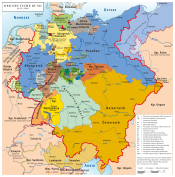Saxe-Hildburghausen
Duchy of Saxe-Hildburghausen Herzogtum Sachsen-Hildburghausen | |||||||||||
|---|---|---|---|---|---|---|---|---|---|---|---|
| 1680–1826 | |||||||||||
 | |||||||||||
| Status | State of the Holy Roman Empire, State of the Confederation of the Rhine, State of the German Confederation | ||||||||||
| Capital | Heldburg (to 1684) Hildburghausen (from 1684) | ||||||||||
| Government | Principality | ||||||||||
| Historical era | Middle Ages | ||||||||||
| 1680 1680 | |||||||||||
| 1702 | |||||||||||
• Passed to Saxe-Meiningen | 1826 | ||||||||||
| |||||||||||
Saxe-Hildburghausen was one of the Ernestine duchies of the House of Wettin.
History[change | change source]
Although it was very small, Saxe-Hildburghausen was an independent duchy from 1680 to 1826. In 1684 the duchy changed its capital from Heldburg to Hildburghausen, and changed its name to Saxe-Hildburghausen.
In 1810, a Princess Therese of Saxe-Hildburghausen married Crown Prince Ludwig of Bavaria, who became king of Bavaria 15 years later. The marriage is the reason for the Oktoberfest, held annually in Munich.
In 1826, the Ernestine duchies were reorganised after the last ruler of Saxe-Gotha-Altenburg died without an heir. The duke of Saxe-Hildburghausen gave up his duchy in return for becoming Duke of Saxe-Altenburg. Hildburghausen was given to Saxe-Meiningen. Hildburghausen was not one of the duchies in the Imperial circle, Altenburg was, so by swapping his land the duke gained in social rank, even though the Holy Roman Empire no longer existed
In 1868, four districts were established in the duchy of Saxe-Meiningen. Hildburghausen was one of these districts, with boundaries very similar to those of the former duchy. It remained almost unchanged until 1993, when the former district of Suhl was dissolved and most of its municipalities joined the district.
Dukes of Saxe-Hildburghausen[change | change source]
- Ernst II (1675 – 1715)
- Ernst Frederick I (1715 – 24)
- Ernst Frederick II (1724 – 45)
- Ernst Frederick III (1745 – 80)
- Frederick (1780 – 1825)
Incorporated into Saxe-Meiningen





